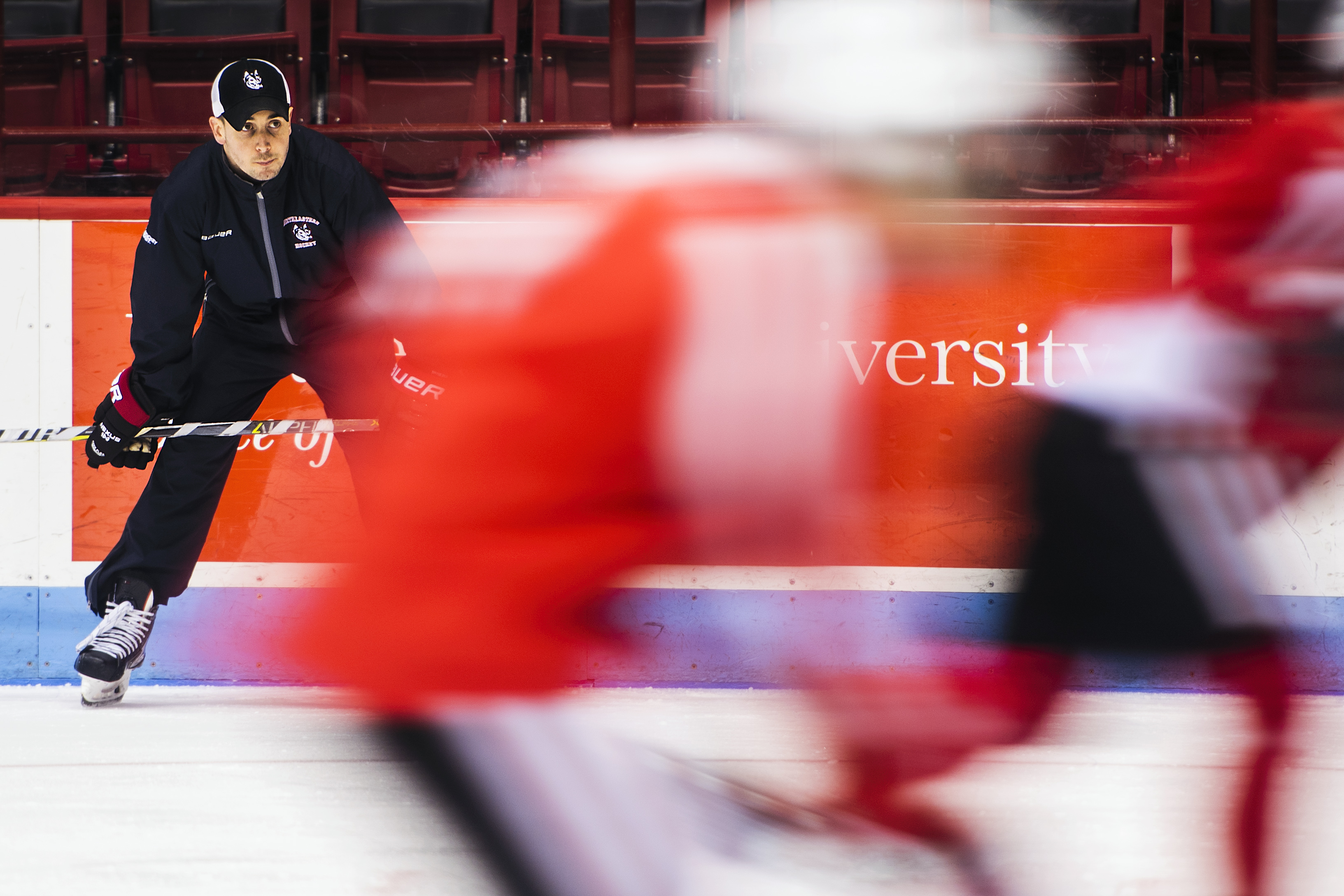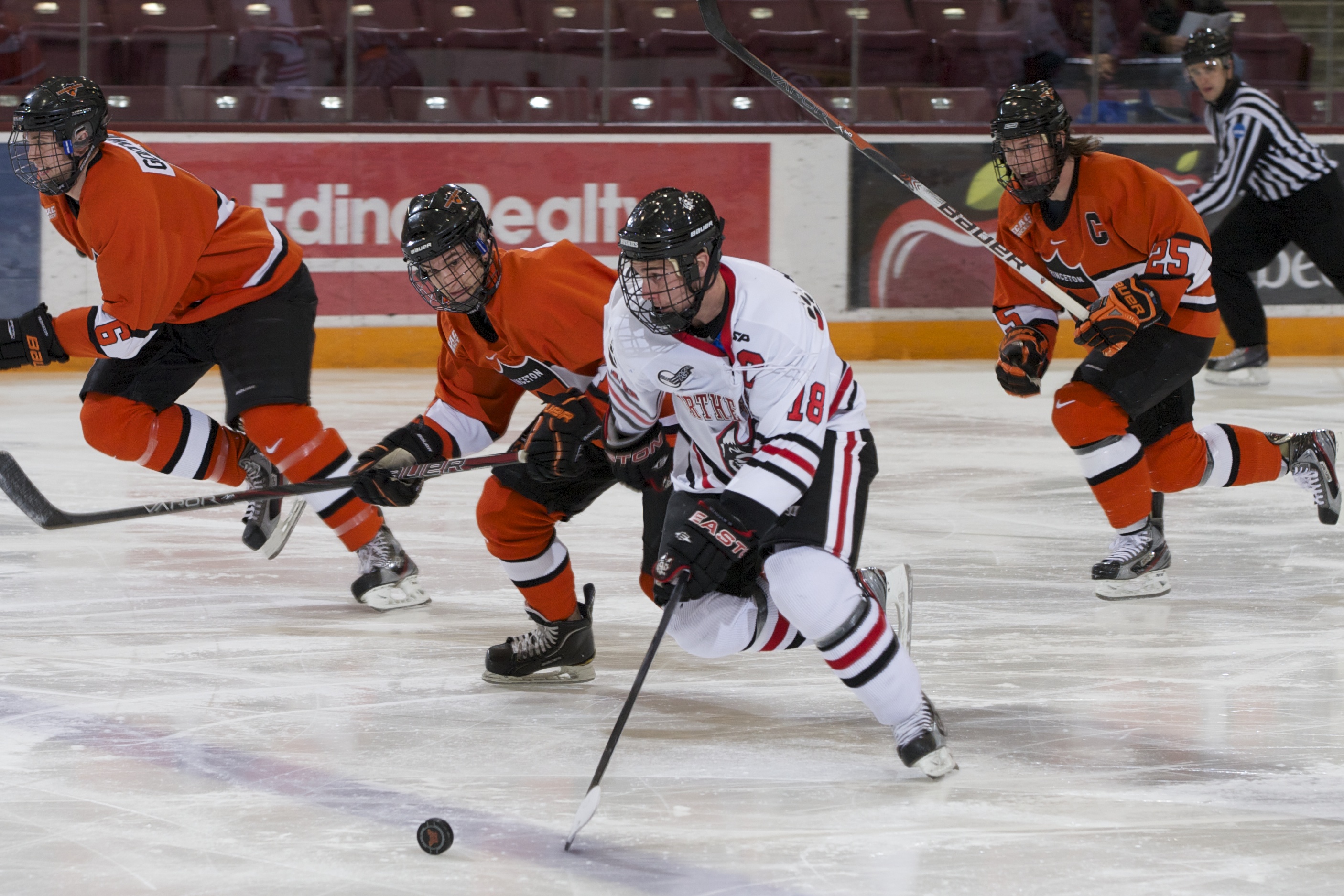
Mike McLaughlin, center, sought help from a sports psychologist his freshman year at Northeastern. (Adam Glanzman/Northeastern University, courtesy)
Just off the side of the ice at Matthews Arena, the oldest hockey venue in the world still in use, sits the office of Mike McLaughlin, director of hockey operations at Northeastern University.
McLaughlin, a former captain for the Huskies, was still coming down from last month’s high of Northeastern winning its first Beanpot tournament since 1988.
"It was an amazing experience,” he said. “It was like we won a national championship."
McLaughlin admitted he wasn’t always on top of the hockey world, however.
Growing up in a small town in Canada, he came to Northeastern in 2008 and was overwhelmed with the hustle of Boston and the demands of being a college student.
On top of that, for the first time in his life, McLaughlin wasn't getting any playing time.
"I was sitting in the stands, and it's something that I've never dealt with before,” he said. “I was homesick. I was going through a lot of things."
With all of that weighing him down, he sought help from a sports psychology consultant.
"So it was kind of talking me down, helping me see the perspective and focusing on what I could do in the moment,” McLaughlin said.
Like other students, the stress of class, grades and meeting others’ expectations takes a toll on college athletes' mental health.
But that stress is intensified astronomically for athletes, who often have to perform well to maintain scholarships. They also face scrutiny that most students never do — from fellow students, alumni, the media and others.
“It's very public,” said Peter Roby, Northeastern’s former athletic director. “They keep score. They put it in the paper. They write about it, they interview after the games. It's on television. It's on the internet. There's no place to hide. So if you're not doing well, if you're failing, everybody's going to know about it. And then they're going to want to know why."
Exacerbating this problem is the limited help available to athletes and what they don’t do when they need some form of mental health care.
A 2014 study by the University of Michigan School of Public Health found that while 30 percent of college students experiencing symptoms of depression or anxiety seek help, only 10 percent of college athletes do.
Roby, a basketball player at Dartmouth in the 1970s, said there are a number of reasons for this gap, but for decades now one stood above the rest: the stigma surrounding mental health and the "suck it up" culture of college athletics.
"You were told just toughen up. Do whatever you have to do and play,” Roby said. “Or it's the pressure of not wanting to let your teammates down. You would rather be out there with your teammates and sacrifice some of your own health to be a part of that culture."
The NCAA has begun addressing the issue of student-athlete mental health over the past decade, but still, many athletes who need help aren't getting it. This isn't just an issue for athletes at Division I schools like Northeastern.
Even students at Division II and III schools not necessarily known for sports grapple with elevated stress. That's why Wellesley College became the first Division III program in the country to adopt mental health programming.
Niki Rybko, director of sports medicine and wellbeing at Wellesley, said a survey of students and staff found an increased need for mental health care, including among athletes.
While Wellesley could afford to later bring in a clinical psychologist who focuses on sports and start training for athletes and staff on mental health, Rybko says there are other, less expensive ways to help students.
"I think through education and demanding it, because it's going to become a thing that has to be done,” she said. “The demand for help is going be too high."
At Northeastern, McLaughlin, who went on to eventually graduate with a master’s degree in sports psychology from Boston University and works as a sports psychology consultant on the side, thinks more can be done. He hopes other athletes seek help — like he did. That means educating coaches about what mental health is and removing the stigma surrounding it.

McLaughlin during his playing days. (Jim Pierce/ Northeastern University)
McLaughlin and other advocates want the NCAA to make it mandatory for athletic programs to have a sports psychologist on staff. For them, it's a simple matter of taking care of athletes’ minds as well as their bodies.
“Just because someone is seeing a sports psychologist or a counselor about depression/anxiety doesn't make them a bad person or a bad player or they're going to negatively impact their team,” he said. “They can help you.”










